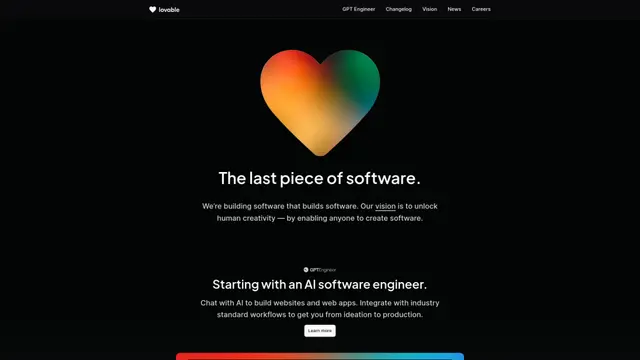Genesis Caratteristiche
Genesis è una piattaforma di simulazione basata sulla fisica completa che combina AI generativa con motori fisici universali per abilitare robotica e apprendimento AI embodied di uso generale attraverso la generazione automatizzata di ambienti e acquisizione di abilità.
Visualizza AltroUlteriori Informazioni
Caratteristiche principali di Genesis
Genesis è una piattaforma di simulazione fisica completa progettata per applicazioni di robotica e intelligenza artificiale incarnata. Combina un motore fisico universale, capacità di simulazione rapida, rendering fotorealistico e funzionalità di intelligenza artificiale generativa. La piattaforma si distingue per la sua capacità di simulare vari materiali e fenomeni fisici, offrendo al contempo compatibilità multipiattaforma, alte prestazioni (fino a 43 milioni di FPS) e un'interfaccia Python intuitiva. Integra più risolutori fisici e supporta un'ampia gamma di robot e modelli di materiali.
Motore Fisico Universale: Integra vari risolutori fisici (corpo rigido, MPM, SPH, FEM, PBD, fluido stabile) in un framework unificato capace di simulare materiali e fenomeni fisici diversi
Simulazione ad Alte Prestazioni: Offre una velocità di simulazione eccezionale di oltre 43 milioni di FPS quando simula un braccio robotico Franka su un singolo RTX 4090, rendendolo 430.000 volte più veloce del tempo reale
Compatibilità Multipiattaforma: Funziona nativamente su Linux, MacOS e Windows, supportando diversi backend di calcolo tra cui CPU, GPU Nvidia, GPU AMD e Apple Metal
Framework Generativo: Presenta un sistema modulare che può trasformare descrizioni in linguaggio naturale in varie modalità di dati, anche se attualmente solo il motore fisico è open-source
Casi d'uso di Genesis
Ricerca e Sviluppo in Robotica: Consente a ricercatori e sviluppatori di testare e convalidare i comportamenti dei robot in un ambiente di simulazione fisica altamente accurato prima del dispiegamento nel mondo reale
Simulazione della Scienza dei Materiali: Supporta la simulazione di vari materiali, inclusi liquidi, gas, oggetti deformabili e materiali granulari per scopi di ricerca e test
Ambiente di Addestramento per AI: Fornisce una piattaforma per addestrare agenti di intelligenza artificiale incarnata con interazioni fisiche realistiche e condizioni ambientali diverse
Test di Automazione Industriale: Permette il test di scenari complessi di automazione e sistemi robotici in un ambiente virtuale con alta fedeltà fisica
Vantaggi
Velocità e prestazioni di simulazione eccezionali
Capacità di simulazione fisica complete
Interfaccia Python intuitiva
Compatibilità multipiattaforma
Svantaggi
Funzionalità generative non ancora disponibili nella versione open-source
Richiede hardware di alta gamma per prestazioni ottimali
Ancora in fase di sviluppo attivo con alcune funzionalità in attesa di rilascio
Articoli Correlati
Articoli Popolari

I 5 migliori generatori di personaggi NSFW nel 2025
May 29, 2025

Google Veo 3: Il primo generatore di video AI a supportare nativamente l'audio
May 28, 2025

I 5 migliori chatbot AI NSFW gratuiti per fidanzate che devi provare - Recensione reale di AIPURE
May 27, 2025

SweetAI Chat contro CrushOn.AI: La resa dei conti definitiva delle fidanzate AI NSFW nel 2025
May 27, 2025
Visualizza altro








